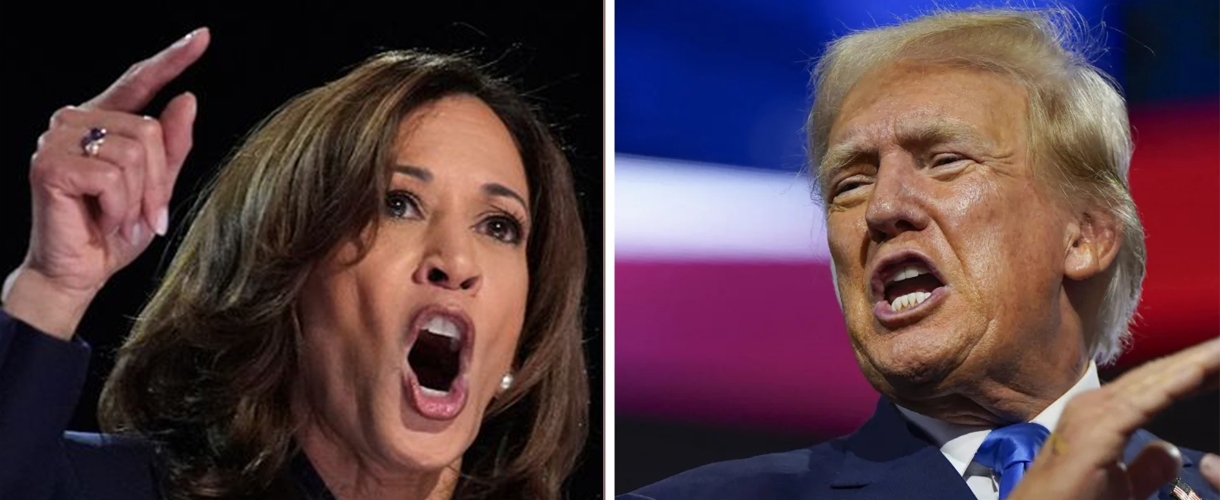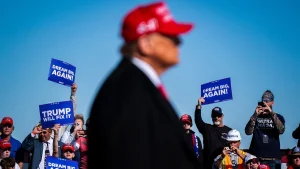No Matter Who Wins, They Will be Enemy of the Chinese

As the 2024 presidential election approaches, the two parties in the U.S. are intensifying their efforts to contain China, with no limits on how tough they can get.
As the U.S. presidential election approaches, a new wave of legislative efforts targeting China is sweeping through American politics. Both Democratic and Republican candidates are competing to show their tough stance on China, especially with relentless moves against China’s emerging industries, like EVs.
For example, on September 23, the U.S. Department of Commerce officially announced a proposal to ban the use of key Chinese hardware and software in smart vehicles within the U.S. The final rule is expected to be confirmed by January 20 next year.
It is worth mentioning that the two parties, which have always had opposing ideas, rarely reached a consensus on the issue of imposing tariffs on Chinese imports.
As early as May 14, the White House issued an announcement announcing additional tariffs on $18 billion worth of products imported from China. According to the document published by the FACT SHEET: President Biden Takes Action to Protect American Workers and Businesses from China’s Unfair Trade Practices published by the White House, the United States will impose tariffs ranging from 25% to 100% on the following products from China:
 The list of Chinese products subjected the increased tariff imposed by the U.S. (Source: Visual Capitalism)
The list of Chinese products subjected the increased tariff imposed by the U.S. (Source: Visual Capitalism)
As of now, since 80% of U.S. port cranes are manufactured by China’s ZPMC, the proposal to impose tariffs has faced strong opposition from American industries. As a result, products like port cranes have been added to a list for delayed implementation, while other measures are still gradually advancing.
 Joe Biden addressed in front of Chinese cranes.
Joe Biden addressed in front of Chinese cranes.
Seeing the Biden administration’s bold moves, it’s no surprise that the typically aggressive Donald Trump would not be outdone—he has promised to push for even harsher measures.
In an interview with Time magazine, Trump stated that if re-elected in November, he would impose even more tariffs on China. He plans to levy a 60% tariff on all Chinese goods and a minimum 10% tariff on $3 trillion worth of all U.S. imports. This approach, even more aggressive than his previous trade war with China, is aimed at reducing federal income taxes and replacing that revenue with tariffs.
There seems to be a sense of urgency in U.S. politics, as if America believes that failing to act now will mean losing its grip on global dominance. To counter this, the U.S. is mobilizing all its resources, building a “small yard, high fence” strategy. Beyond imposing tariffs, it is restructuring supply chains through near shoring and friend-shoring, either persuading or pressuring allies and ideologically aligned nations to join in containing China.
For example, Canada, after detaining Meng Wanzhou at the behest of the U.S., once again followed America’s lead by mirroring its punitive tariffs on China. On August 26, Prime Minister Justin Trudeau announced that Canada would impose a 100% tariff on EVs imported from China and a 25% tariff on Chinese steel and aluminum. These tariff rates match those imposed by the U.S.
Another example is the European Union. Shortly after the U.S. announced a new round of tariffs in May, the European Commission followed suit. On June 12, it declared that, starting July 4, the EU would temporarily raise import tariffs on Chinese EVs. However, due to pressure from businesses and markets, the rates were later lowered.
Following the crackdown on Huawei, a new strategic battle to stifle China’s EVs and new energy industries is now unfolding.
Civilians are bearing the costs of politicians’ escalating tough stance on China.
Since Trump initiated the trade war with China under the guise of fair trade and balancing the U.S.-China trade deficit, the U.S. has consistently wielded the sanctions stick worldwide. It has become increasingly addicted to this approach, eager to punish anyone who doesn’t align with its interests.
Actually, trade war is always a double-edged sword, which cannot hurt the opponent without affecting the initiator himself. Indeed, Trump’s trade war, combined with Biden’s tech restrictions, has created significant challenges for China’s economy. However, most of the tariffs imposed by Trump have been passed on to American consumers, burdening U.S. businesses and the public.
As U.S. Vice President Kamala Harris stated at a campaign rally in North Carolina on September 16, Trump’s import tariffs are essentially a “Trump tax” on the American people. During a debate with Trump, Biden also harshly criticized Trump’s tariff policy, claiming it costs each American household an additional $2,500 annually.
It’s worth noting that a recent analysis by the Peterson Institute for International Economics found that if Trump were to impose a 10% tariff on all goods and a 60% tariff on China, a typical family in the middle of the income distribution would see their annual expenses increase by about $2,600.
 Distribution of tax increases and reductions under Trump proposals, percent change in after-tax income (Source: PIIE)
Distribution of tax increases and reductions under Trump proposals, percent change in after-tax income (Source: PIIE)
Also, an analysis by the American Action Forum estimates that a 10% tariff could add up to $2,350 in extra costs per year for each U.S. household. Additionally, a 60% tariff on Chinese goods would further increase household expenses by an additional $1,950 annually.
Whether it’s a 25% or 60% tariff, the extra costs imposed on U.S. consumers show that the American market needs these products. If decoupling from China were truly feasible, Trump or Biden would have achieved it by now. Bold words aside, both presidents eventually realized the U.S. is too dependent on Chinese goods and resources. Immediate decoupling would be disastrous for the U.S.
Exactly, decoupling would certainly create tough times for China’s export-driven businesses for a while. However, the U.S. market could face severe shortages, with half of its goods unavailable, leaving consumers unable to purchase everyday items, even if they have the money. Life would become unmanageable.
 A view of empty shelves at a local Giant supermarket in Alexandria, Virginia.
A view of empty shelves at a local Giant supermarket in Alexandria, Virginia.
Para Bellum
“Para bellum” is a Latin phrase meaning, “If you want peace, prepare for war.” Lately, U.S. politicians have been citing this phrase, positioning themselves as innocent peacekeepers forced into conflict for the sake of peace. A striking example is the assassination of Hamas leader Ismail Haniyeh during his visit to Tehran. To prevent Iranian retaliation against Israel, the U.S. deployed two carrier strike groups to protect Israel.
So “para bellum” actually serves as a moral and legal pretext for them to suppress rivals and flaunt their military power. Those who frequently use this phrase are more interested in the spoils of power-driven conflict. The belief that overwhelming strength can crush any opponent is the jungle law Western powers have relied on for centuries.
Take the recent events as an example. During the UN Future Summit, the reformist Iranian President Masoud Pezeshkian compromised with Israel and said that he would not retaliate against Israel for Haniyeh’s death, trying to prevent the expansion of the conflict. The result was just the opposite. Iran’s compromise was exchanged for Israel’s further encroachment. The Israeli army successively carried out pager explosions in Lebanon, killed Hezbollah leaders including Nasrallah in the bombing, and launched a ground war against Hezbollah in Lebanon.
Therefore, for this kind of enemies, compromise will not bring peace, but will only make them increasingly aggressive and greedy.
U.S. Deputy Secretary of State Kurt Campbell stated before the House Foreign Affairs Committee on September 18 that China poses the greatest comprehensive challenge in U.S. history, surpassing even the Cold War. “Frankly, the Cold War pales in comparison to the multifaceted challenges that China presents. It’s not just a military challenge; it’s across the board. It is in the Global South. It is in technology. We need to step up our game across the board.”
Both U.S. parties are unprecedentedly united in their hostile stance toward China. Regardless of who takes office next, a new round of U.S.-China trade conflict seems inevitable. Moreover, conflict may not be limited to trade alone.
Will China allow the “naive but rich” stereotype to repeat itself? Clearly not. In recent years, public discourse has shifted, with the view that “Cast Away Illusions, Prepare for Struggle” becoming a widespread consensus. The idea that “Throw out one punch now to avoid a hundred punches in the future.” is gaining acceptance. After all, if a trade war with China proves profitable without significant backfires, other countries might follow the U.S. to “feast” on China’s resources.
Editor: Chang Zhangjin
https://www.guancha.cn/HouFeng/2024_10_06_750815_2.shtml




